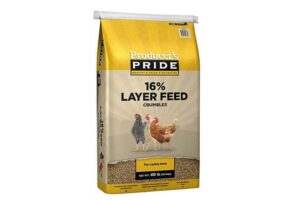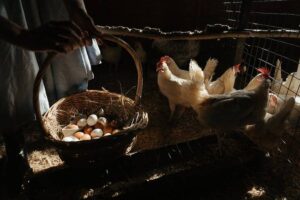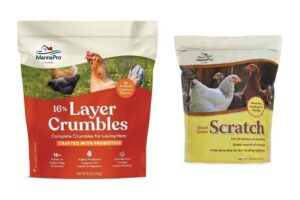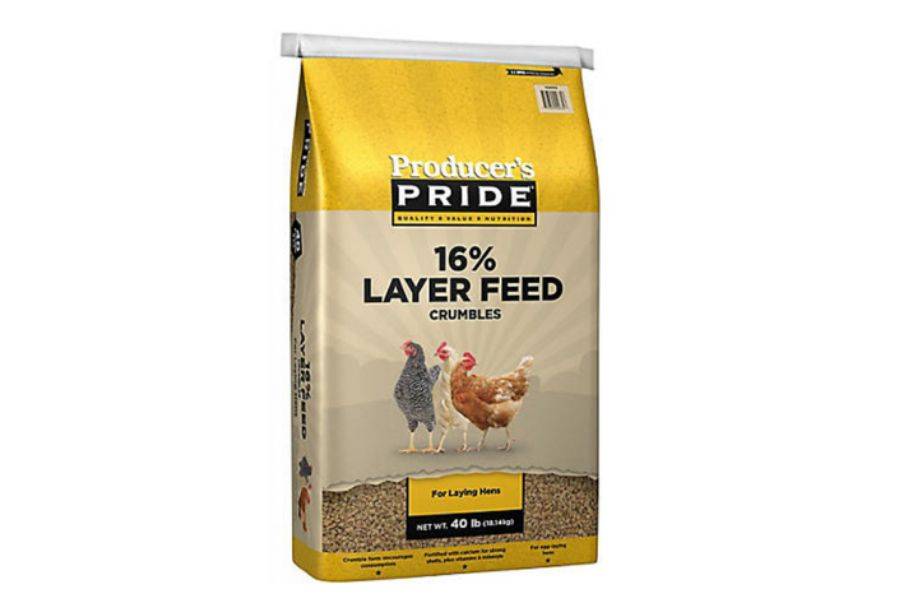Table of Contents
To understand the potential problems with chicken feed from Tractor Supply, it’s essential to first comprehend the basics of what quality chicken feed should contain.

This includes a balanced diet consisting of proteins, carbohydrates, fats, vitamins, and minerals.
The section will also debunk common misconceptions about chicken feed, such as the belief that chickens can survive on scraps alone.
Components of Quality Chicken Feed
Quality chicken feed is more than just grains; it’s a carefully balanced blend of different components designed to meet a chicken’s nutritional needs.
This includes protein sources like soybean meal, carbohydrate sources like corn and wheat, fats for energy, and essential vitamins and minerals for overall health.
The Importance of a Balanced Diet for Chickens
Just like humans, chickens need a balanced diet to thrive. This means not only consuming enough food, but also ensuring that their food provides a wide range of nutrients.
Without a balanced diet, chickens can suffer from a variety of health issues, including poor egg production, stunted growth, and susceptibility to disease.
Common Misconceptions About Chicken Feed
Many people mistakenly believe that chickens can survive on kitchen scraps or free-ranging alone.
While these can supplement a chicken’s diet, they are not sufficient to provide all the necessary nutrients. Chickens need a balanced commercial feed to ensure they receive all the necessary nutrients.
Identifying Problems with Tractor Supply Chicken Feed
Chicken feed from Tractor Supply has generally been well-received by customers. However, there have been instances where customers have reported issues.
Understanding these problems can help you make an informed decision about whether their products are right for your flock.
Nutritional Deficiencies in Feed
Some customers have observed that their birds were not receiving enough protein and energy from certain types of Tractor Supply feeds, particularly the Dumor brand.
This lack of nutrition was especially noticeable during periods when the birds required more nutrients, such as the colder months.
Contamination Risks
There have been reports of E.coli contamination in Tractor Supply chicken feed. The specific brands mentioned by customers were Dumor and Pride Producers layer pellets.
This led to severe health issues, with some chickens unfortunately not surviving.
Impact on Egg Production

Tractor Supply chicken feed has also been blamed for low egg production by poultry farmers across the country.
While the exact cause is not clear, it’s suggested that the feed may not be providing the hens with the necessary nutrients for optimal egg production.
Presence of Heavy Metals and Pesticides
A lab test conducted on Tractor Supply’s Producer’s Pride Chicken Feed revealed the presence of heavy metals and pesticides.
These substances can lead to a range of health issues in chickens if consumed in large quantities over time.
Improper Nutrition Leading to Recalls
Improper nutrition in feed products has led to recalls in the past. This could mean that the feed did not contain the right balance of nutrients needed for the chickens’ health and well-being.
It’s important to note, however, that these issues do not represent the experience of all Tractor Supply customers and many have had positive experiences with their products.
If you decide to purchase chicken feed from Tractor Supply, it’s always a good idea to monitor your flock closely for any changes in health or behavior.
The Impact of Feed on Egg Production
The quality and type of chicken feed can have a significant impact on egg production.
This section will discuss how nutrition affects egg quality, common feed-related issues impacting egg production, and Tractor Supply feeds designed for optimized egg laying.
How Nutrition Affects Egg Quality
The nutrients that hens consume directly affect the quality of the eggs they produce.
For example, a diet rich in calcium and vitamin D will result in eggs with strong shells, while a diet high in omega-3 fatty acids can increase the omega-3 content of the eggs.
Common Feed-Related Issues Impacting Egg Production
If hens aren’t getting the right nutrients, it can lead to problems like poor egg production, weak egg shells, or small egg size.
Other feed-related issues could include dietary imbalances, feeding rations that are too low, or feeding a diet that’s not appropriate for the hens’ stage of life.
Tractor Supply Feeds for Optimized Egg Laying
Tractor Supply offers several types of layer feeds designed to support optimal egg production. These feeds contain a balanced blend of nutrients, including increased levels of calcium for strong egg shells.
Exploring Alternatives to Tractor Supply Feeds
While Tractor Supply’s chicken feeds are a popular choice, they’re not the only option.
This section will discuss the pros and cons of homemade chicken feed, other commercial feed brands to consider, and the benefits of supplementing feed with free-range foraging.
Homemade Chicken Feed: Is It Worth It?
Some backyard chicken keepers choose to make their own chicken feed. This allows them to control exactly what goes into the feed and potentially save money.
However, formulating a balanced chicken diet can be challenging, and it can be time-consuming to source and prepare the ingredients.
Other Commercial Feed Brands to Consider

There are many other commercial chicken feed brands available, each with its own benefits and drawbacks. Some popular alternatives to Tractor Supply feeds include Purina, Nutrena, and Manna Pro.
Benefits of Free-Range Foraging
Allowing chickens to forage for their own food can be a good supplement to commercial feed.
Chickens can find a variety of insects, seeds, and plants that can provide additional nutrients and enrichment. However, free ranging should not replace a balanced commercial feed.
Handling Feed Recalls
On rare occasions, chicken feed may be recalled due to issues like contamination or nutritional imbalances.
This section will explain why feed recalls happen, the process of a feed recall, and how to respond if your feed is recalled.
Understanding Why Feed Recalls Happen
Feed recalls can occur for several reasons, including contamination with harmful substances, incorrect nutrient levels, or the presence of unauthorized ingredients.
Recalls are a way for companies to protect animal health and consumer safety.
The Process of a Feed Recall
When a feed recall occurs, the company will typically announce the recall publicly, providing details about the affected product and the reason for the recall.
They may also provide instructions for returning the product or obtaining a refund.
How to Respond if Your Feed Is Recalled
If you discover that your chicken feed has been recalled, stop using it immediately. Follow the company’s instructions for returning the product or disposing of it safely.
You may also want to monitor your chickens closely for any signs of health problems.
Conclusion
In conclusion, Tractor Supply offers a wide range of chicken feed options to cater to various needs.
However, understanding the basics of chicken nutrition, potential problems with chicken feed, and how to navigate the options available can help you make an informed decision for your flock.
If in doubt, it’s always a good idea to consult with a poultry nutrition expert or veterinarian.









